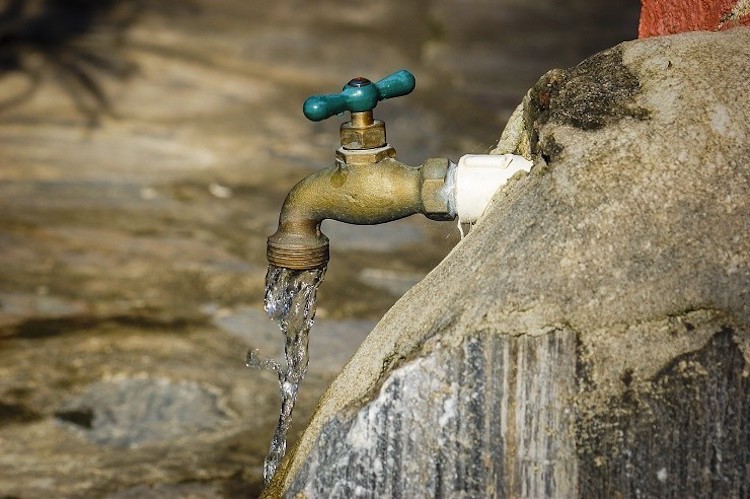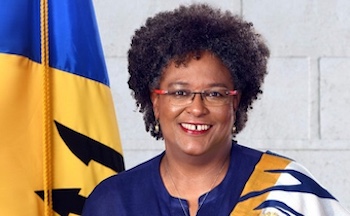
By Linda Hutchinson-Jafar
PORT OF SPAIN, Trinidad, 29 June 2023 (IDN) — With an estimated 4 billion people facing water scarcity around the world, a regional water conference held earlier this month addressed the unique issues small island nations of the Caribbean face in confronting this challenge. These include climate change, which is having a profound impact on the hydrological cycle in the Caribbean. (P09) JAPANESE | SPANISH
This, in turn, is escalating aridity and heightened water stress, increasing both the frequency and severity of droughts. At the same time, a lack of financial resources is hindering attempts to address the associated water scarcity problems.
At the recent Caribbean Water Conference held in Barbados (June 6-7) experts and speakers highlighted the urgent need for action to address the Caribbean’s dire water crisis.

Barbados Prime Minister, Mia Mottley (left in picture), who spoke at the launch of the conference, highlighted the injustice of forcing countries to borrow exorbitant amounts at high-interest rates for short periods to finance basic water infrastructure projects particularly in light of saltwater incursion, reduced precipitation, and increased evaporation.
Mottley asserted that the water crisis represents the “greatest challenge of our time” and poses significant problems for small island states, necessitating immediate action on various fronts. She added that the impact of climate change, coupled with limited resources and access to financing exacerbates the region’s vulnerability.
Chris Corbin, Coordinator of the United Nations Environment Programme asserted that the repercussions of climate change on water resources are manifold and exacerbating existing challenges and intensifying the competition for this finite resource.
He noted the state of water resources in Latin America and the Caribbean is a cause for concern. Currently, a staggering 25% of people throughout Latin America and the Caribbean lack access to safe drinking water leaving them vulnerable to waterborne diseases and other health risks while an alarming 60% of the population has no access to safe sanitation services, compounding the risks to public health and environmental well-being.
“The competition for the use of this limited resource is something that climate change is exacerbating. How do you balance the demands for water aging infrastructure, human health, and ecosystem integrity?” he asked.
Dr. Armstrong Alexis, Deputy Secretary General of the 20-member Caribbean Community (CARICOM) also emphasized that changes in climatic conditions such as increased temperatures, reduced rainfall, prolonged droughts, desertification, salination, and intensified hurricanes have a severe negative impact on freshwater resources in the Caribbean.
These challenges are further exacerbated by the limited options available to small and low-lying states with limited land mass in developing their water resources. “Their very construct means that their material resources including their freshwater supply and capacity to generate the resources is by definition equally limited,“ he said.
Dr. Alexis added, “We are at a critical juncture and the timeliness of this conference should serve to place the current and evolving water management needs of the region (in its proper context)”. He pointed out that global responses are often designed to respond to a scale that inadequately addresses the needs of the smaller, less endowed nations of the globe.
Roger Pulwarty, Senior Scientist, at the Physical Sciences Laboratory at the National Oceanic and Atmospheric Administration (NOAA) emphasized that the lack of access to fresh water is the primary driver of water-related challenges faced by small islands in the Caribbean. “That’s the driver. It’s not hurricanes, it’s not sea level rise, it’s the lack of access to fresh water,” he said during a panel discussion. He added that understanding the movement of moisture is critical as it determines the availability of freshwater in the Caribbean.
In the face of the ongoing water crisis, he said it is evident that efforts to coordinate and take action are falling short.
“It seems like we’re playing different games and a series of paradoxes…occur. Let’s get the biggest economic value for that drop of water and protect the environment. Let’s work on how people have equitable access,” said Pulwarty, a scientist from Trinidad and Tobago who contributed to the work of the Intergovernmental Panel on Climate Change (IPCC). He does not rule out the privatization of water to address the problem.
Describing water as the “essence of life,” Gillian Cadwell, Chief Climate Officer and Deputy Assistant Administrator of USAID said the resource has become the battleground for one of the most pressing challenges that humanity faces today.
According to Caldwell, nearly 90% of climate-related disasters are directly linked to water-related issues, ranging from devastating floods and typhoons to crippling droughts that currently plague the Horn of Africa.
The severity of these challenges is only worsening, with UNICEF estimating that approximately 4 billion people worldwide facing water scarcity, and projections suggest that by 2025, at least 50% of the global population could confront severe water scarcity for at least one month per year.
She said the reasons behind this escalating crisis are multifaceted. The world is witnessing both dramatic increases and reductions in rainfall, leading to erratic water-related events that wreak havoc on the critical infrastructure necessary for water delivery and waste management systems.
With rapid urbanization adding to the problem, the consequences of water scarcity reverberate throughout society, impacting various aspects of life, said Caldwell. “There are declines in productivity, increases in prices, decreases in nutrition has an impact on children, stunting of growth, intellectual and physical. Water is life and can also mean death,” she added.
Colin Young, Executive Director of the Caribbean Community Climate Change Centre (CCCCC) revisited the argument put forward by the Barbados Prime Minister. He identified significant challenges faced by small countries seeking access to financing for climate resilience projects, particularly in the water sector, and highlighted the complex and fragmented process which hinders the ability of vulnerable nations to effectively address urgent climate issues.
He emphasized that the lack of access to affordable financing is a major hurdle for countries such as those in the Caribbean striving to tackle climate change impacts. “I am very confident in saying that the international climate finance architecture, it’s not serving the needs of the most vulnerable countries in the world. It is far too complex, it is far too slow, and it doesn’t deliver the financing at this scale to be able to address the urgency of the issues we are experiencing,” he said.
Various funding mechanisms such as the Green Climate Fund and bilateral arrangements have been established to provide climate finance. However, he said the reality is that these donors operate with fragmented processes and differing criteria, making it difficult for countries to navigate and meet the necessary co-financing requirements. This fragmented landscape further compounds the challenges of accessing climate finance for water resilience projects.
Moreover, the existing policies of the donors often fail to align with the specific needs of regions. Young pointed out that developing a water program for the Caribbean, for instance, requires navigating a country-by-country approach rather than a cohesive regional framework.
“The reality is that the world must do right by the people of the earth, the world must do right by the biodiversity that is essential for us to maintain the balance of this planet,” argued Mottley in her opening address. “For that to happen we need to ensure that countries are not forced to borrow at double-digit amounts for short periods to be able to finance basic water infrastructure to protect their people.” [IDN-InDepthNews]
Photo: Public Water tap. Credit: Caribbean Community Secretariat.











